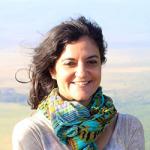
Natalia A. Rossi, Ph.D.
Dr. Natalia Rossi is the Cuba Country Manager of the Mesoamerica and Western Caribbean Program for the Wildlife Conservation Society. With Cuba’s wildlife and wild places at a critical crossroads, Natalia leads the development of WCS Cuba program to help strengthen Cuba’s protected areas management and sustainable fisheries.
What do you enjoy most/what do you find most interesting about your research topic?
Our project seeks to merge scientific research, ecological teaching, and community outreach with the goal of mapping and monitoring biodiversity in critical areas of the Banao River Basin in Central Cuba. It will be extremely interesting to uncover the species composition of this area and identify individual species that may be more vulnerable to changes in the environment. As one of the fastest developing regions in the country, Central Cuba is an ideal place to closely monitor potential changes in biodiversity and look for linkages between these and increasing human impact. I am particularly interested in following endangered Cuban Parrots and Parakeets’ population trajectories, and use this information to strengthen their protection
How does citizen science support your research?
Cuba is undergoing a significant increase in tourism, and plans for development projects are underway. Our project seeks to work with citizen scientists to promote people exchanges to safeguard Cuba’s biodiversity at this pivotal time of history. Citizen scientists will provide an exceptional opportunity to gather large sample numbers in a large area, generating sizable datasets to inform conservation in the short and mid-term. Through the involvement of citizen scientists, we will create a unique opportunity for cultural exchange and information sharing. Information regarding Cuba’s biodiversity and environmental challenges is often lacking in the English language, and people do not generally know about the conservation values of this island country. In this sense, citizen scientists will become ambassadors to improve public engagement and disseminate knowledge about Cuba’s outstanding biodiversity, local talent, and the challenges to conservation and management in the country. Citizen scientists will also be fundamental to harnessing the passion and enthusiasm for the benefit of nature conservation, and to share these positive attitudes with local communities. Citizen science will also promote the development of local leaders, who will have the chance to teach and learn from citizen scientists. Cuban citizens from rural communities will be invited to participate in monitoring activities.
What is one of your favorite moments in the field?
Cuba is an exceptional place for the nature-curious and nature-lovers. So many of the species you come across are endemic to the country – meaning that these occur only in Cuba, and sometimes only in a small area within Cuba. For me, one of the favorite moments in the field occurred in an early morning of bird monitoring. One usually looks at the top of trees expecting to see and identify birds. In Cuba, however, many other animals spend much of their time in the top of the trees. I was amazed to find a couple of Cuban iguanas and a mother and newly born hutia (medium-size rodents endemic to Cuba) that morning, while I was initially targeting birds. You never know what you can find in the forest!
Education
- Ph.D. in Ecology, Evolution and Environmental Biology, Columbia University, NY (U.S.)
- M. Phil. in Ecology and Evolutionary Biology, Columbia University, NY (U.S.)
- M.A. in Conservation Biology, Columbia University, NY (U.S.)
- Licenciatura en Ciencias Biológicas, Universidad de Buenos Aires (AR)
